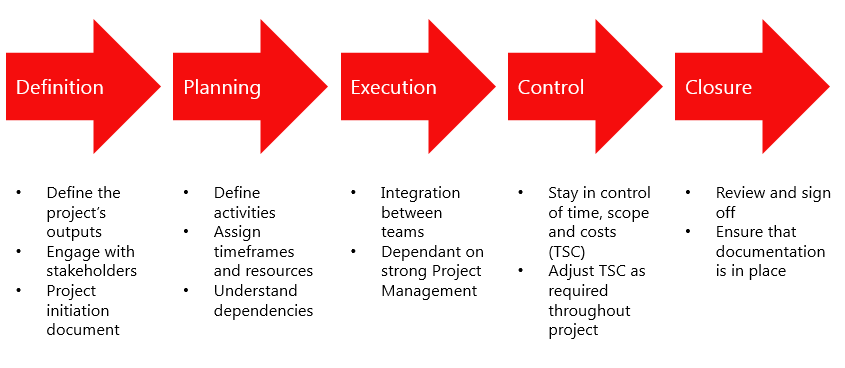In our previous blog posts we explained what project management is and why it’s important, and we introduced the concept of the project management triangle.
Now that we’ve explored some of the concepts that make up project management, we’re going to take a look at what actually takes place during a project.
For this blog, then, we’ll explain the five stages of a project. Every project is unique, but you should find that – if best practices are followed – each one follows the five stages of definition, planning, execution, control and closure.
Definition
In order for a project to be successful it is essential that its outputs (what the project is trying to achieve) are defined. The definition stage requires engagement with stakeholders, whose input will factor into a project initiation document that clearly and concisely defines the project’s scope.
Planning
During the planning stage, the multiple activities that will combine to complete the project are defined. Timeframes and resources for each activity need to be identified, and any dependencies – for example, you can’t begin a certain activity until another has completed – should be understood and accommodated.
Planning should take into account the project management triangle, ensuring that time, scope and cost are understood for each activity.
Execution
You’ve defined the scope of your project, and you have a plan in place for how you’re going to achieve it. Here is where you start working on the activities that you’ve planned out. Effective project execution requires communication and integration between the teams and individuals responsible for completing the project elements. This makes strong Project Management absolutely key.
Control
Throughout the execution of the project, remember to stay in control of time, scope and costs: if one or more of them change – and they very likely will – then the others will have to adjust to accommodate.
Closure
The final stage of a project, closure is where stakeholders review the previous four stages and provide sign-off that the final outcome meets the agreed project scope. An important – and sometimes overlooked – element of project closure is documentation: for the changes enacted by the project to become ‘business as usual’, appropriate documentation is required for both users and administrators.
Each of the five stages of a project is important in its own right, and requires careful management to ensure that it contributes towards the successful delivery of a project’s goals. At TSC Projects we manage the entire project lifecycle, from definition through to closure; contact us to learn more about the importance of the five stages of a project, and how strong Project Management supports successful completion.




